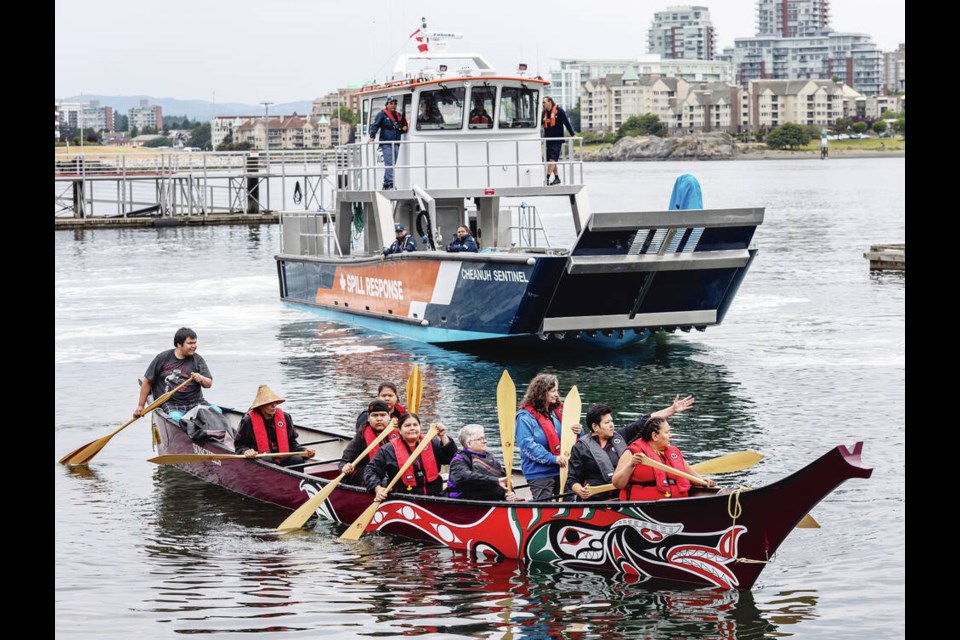Songhees elder Mike Charlie proudly welcomed a diverse flotilla of modern boats to the Inner Harbour on Friday.
The vessels ranged in size and purpose — from the 52-foot Cheanuh Sentinel oil-spill response ship to smaller fisheries vessels and landing craft — even a four-foot remotely controlled inflatable equipped with emergency spill supplies.
All are owned and operated by 10 south Island First Nations, who are blending new technology with traditional knowledge of the seafaring people who have lived here for centuries.
“I’m very happy for the younger generation who will use these to protect our Salish Sea, and for them to realize they have a community to watch over,” said Charlie, 73.
In the face of climate change that is rapidly changing the ocean, and increasing tanker and ship traffic that endangers everything that lives within and around it, Charlie said First Nations are now part of actively protecting the waters they rely on for food — something they’ve done through the generations.
“It’s good to see our people out on the water again and helping it,” said Charlie, noting he used to watch his grandfather fish with traditional lines in dugout canoes. “This is a good day to see for us and for all our neighbours. We’re in this together.”
First Nations on the south Island operate 22 specialized boats that are engaged in all forms of land and marine stewardship, participating in the “blue economy,” said Christina Clarke of the Indigenous Prosperity Centre, which promotes economic reconciliation through government and private partnerships.
“These vessels do all sorts of things,” said Clarke. “And they are Indigenous-led, providing jobs and skills while protecting the land and water.”
First Nations involved include Songhees, Esquimalt, Scia’new, T’Sou-ke, Malahat, Pacheedaht, Tsawout, Tsartlip, Tseycum and Pauquachin.
The Beecher Bay Scia’new Nation has an oil-spill-response station at East Sooke with several ships, including a diving vessel that trains First Nations scuba divers for marine emergencies.
Some nations are focused on high-tech initiatives in ocean monitoring, like the T’Sou-ke Nation, which has remotely operated vessels with cameras and drones, and the Malahat Nation, which is using satellites to monitor the ocean from space.
Others, like the Tseycum and Songhees Nations, have interests in accessing and protecting specific sacred sites, eliminating invasive species and restoring the sites for future generations and for tourism and educational purposes.
Chatham Islands off Oak Bay, known traditionally as T’ches, or Tlchess, were never ceded in the Douglas Treaties and remain traditional Songhees land. The nation had traditional summer homes there.
Cynthia Dick of Explore Songhees said a new landing craft now allows members of the Songhees to visit the islands and collect plants and other medicines. “A shore-landing vessel is going to help bring our people to the islands, including elders and some of the people who were part of the Sixties Scoop who are returning to our nation,” said Dick, adding more non-Indigenous people have been on the Chatham Islands than Songhees people.
Songhees Chief Ron Sam said the nation’s marine stewardship reflects a deep connection to the land and water.
He said the vessels support the preservation of cultural heritage and create jobs.
“By combining traditional wisdom with modern scientific approaches, we can implement conservation strategies that balance the needs of the present and future generations,” said Sam.
The spill response centre of Scia’new First Nation at Beecher Bay involves partnerships with Western Canada Marine Response Corporation and Kotug Canada ahead of the completion of the Trans Mountain Pipeline expansion project.
Traffic is expected to grow to about 34 tankers per month through Juan de Fuca Strait as a result of the bigger pipeline.
Two tugboats based at Beecher Bay will be the exclusive escort providers in the region between the outer boundary of the Port of Vancouver and the western entrance of Juan de Fuca Strait near Port Renfrew.
Sc’ianew First Nation Chief Russ Chipps said his nation is now a critical cog in protecting the Salish Sea. He said Race Rocks just off the coast is the “great roundabout” for tankers heading to Vancouver and Washington state.
“I feel like Beecher Bay should be the ambulance for the sea and should be the centre for research and development for anything that happens on the ocean,” said Chipps. “And we’re willing to stand up and do whatever it takes to protect our ocean.”
There are currently 12 response vessels at the Beecher Bay base, and Chipps said it’s not just about oil. The vessels are used for daily environmental monitoring of a variety of ecological systems, such as herring and eelgrass, which Chipps said are foundational for all other species, including whales, and for food for First Nations and others.
“It’s our responsibility to do what it takes to protect our food out there, and it’s important to get our people home and into the blue-water economy,” said Chipps.
“We just can’t keep on status quo, pushing and pulling. It’s important to get this economy going and protection to happen. And it has to be us.
“We know what food has to be protected. We know what’s disappearing.
“We know you can’t feed a whale through a tube. We know we need more fish. There’s a lot of work and we need to collaborate with all communities to protect our food.”
>>> To comment on this article, write a letter to the editor: [email protected]



